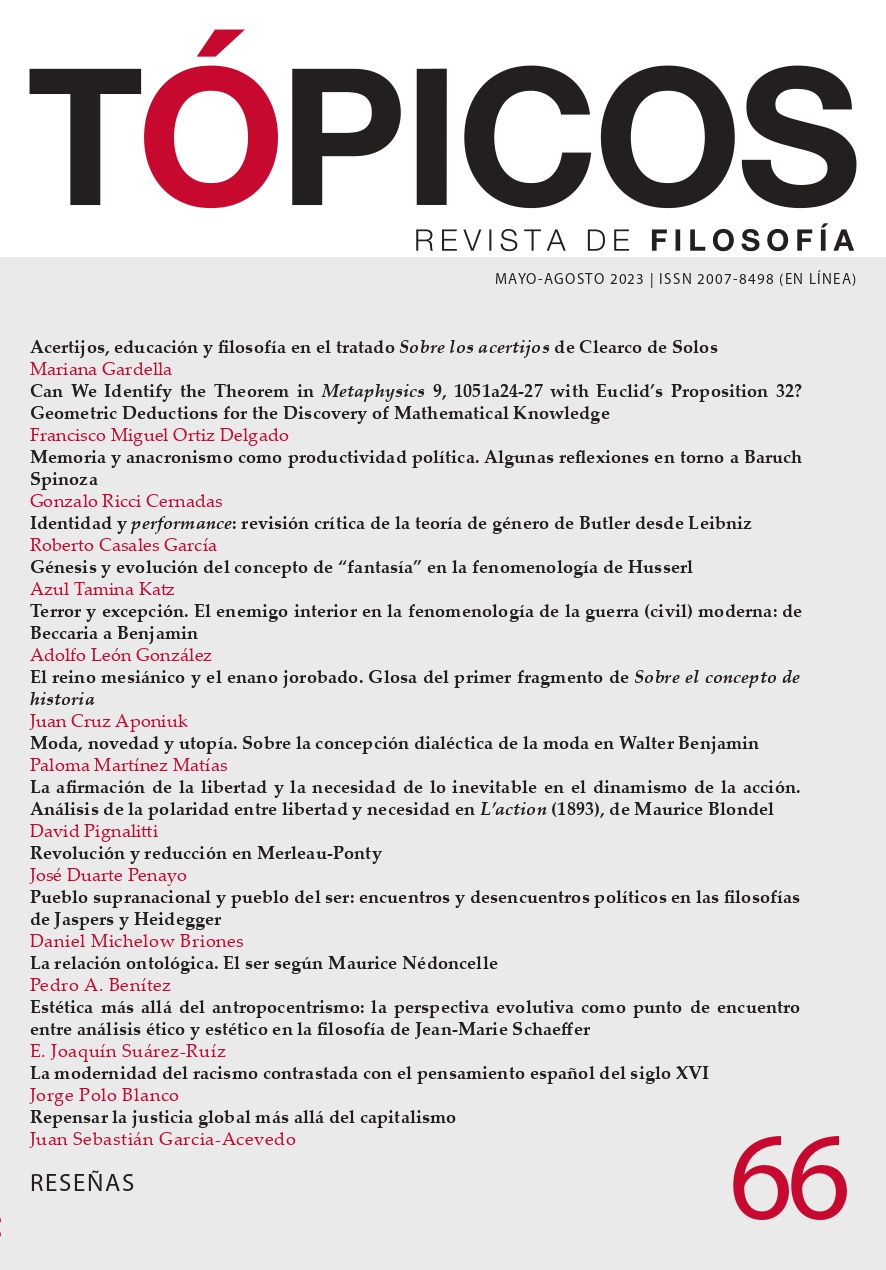Publicado 2023-04-11
Palabras clave
- Leibniz,
- identidad personal,
- Butler,
- género,
- performatividad
Derechos de autor 2023 Tópicos, Revista de Filosofía

Esta obra está bajo una licencia internacional Creative Commons Atribución-NoComercial-SinDerivadas 4.0.
Cómo citar
Resumen
Este artículo analiza la teoría butleriana de los actos performativos y su crítica a las teorías substancialistas o esencialistas del género a la luz de la teoría leibniziana de la acción intencional con el objetivo de mostrar que no podemos disociar la performatividad de la intencionalidad ni, en consecuencia, de una comprensión práctica de la identidad personal. Para lograr este objetivo, realizo tres cosas: en primer lugar, un análisis de la teoría del género y la noción de “performatividad” de Butler desde su crítica a las teorías naturalistas o esencialistas del género; en segundo, confronto su teoría de la performatividad con la teoría leibniziana de “acción intencional” y su noción de “agencia moral”; en tercer lugar, esbozo dos conclusiones: 1) solo podemos hablar de performatividad en términos de intencionalidad, y 2) hablar de actos performativos no implica disociar el género de nuestra identidad personal.
Referencias
- Butler, J. (1998). Actos performativos y constitución del género: un ensayo sobre fenomenología y teoría feminista. M. Lourties (trad.). Debate feminista, 18, 296-314.
- Butler, J. (2007). El género en disputa. El feminismo y la subversión de la identidad. M. A. Muñoz (trad.). Paidós.
- Butler, J. (2021a). Deshacer el género. P. Soley-Beltrán (trad.). Paidós.
- Butler, J. (2021b). Sin miedo. Formas de resistencia a la violencia de hoy. I. Pellisa (trad.). Taurus.
- Casales, R. (2013). La “máxima” como base de la acción en la filosofía práctica de Kant. Universitas Philosophica, 61, 237-258.
- Casales, R. (2018a). Esbozo de una fundamentación ontológica de la moral en Leibniz. En R. Casales y P. Reyes (eds.), Leibniz en México. Homenaje a Alejandro Herrera. (pp. 207-218). Torres y Asociados.
- Casales, R. (2018b). Justicia, amor e identidad en la ontología monadológica de Leibniz. Colección Nova Leibniz. Comares.
- Casales, R. (2021). La estructura ontológica de la acción intencional. En G. Martí y R. Casales (eds.), Metafísica y familia. Homenaje a Tomás Melendo. Tomo I. Fundamentación. (pp. 213-246). Torres y Asociados.
- Casales, R. (2022). Identidad personal, cualidad moral y conscientia en Leibniz. Dianoia, 67(88), 3-24.
- Duchesneau, F. (2012). La relación organismo-mecanicismo: un problema de la controversia Leibniz-Stahl. Revista de Filosofía de la Universidad de Costa Rica, 51(129-131), 187-197.
- Jorgensen, L. (2019). Leibniz’s Naturalized Philosophy of Mind. Oxford University Press.
- Leibniz, G. W. (1864-1884). [Klopp]. Die Werke von Leibniz. O. Klopp (ed.). Once volúmenes. Klindworth Verlag.
- Leibniz, G. W. (1923 y ss.). [AA]. Sämtliche Schriften und Briefe. Deutschen Akademie der Wissenschaften zu Berlin.
- Leibniz, G. W. (1954). [Robinet I]. Principes de la nature et de la grâce fondés en raison. Principes de la philosophie ou Monadologie. A. Robinet (ed.). Presses Universitaires de France.
- Leibniz, G. W. (1961). [Couturat]. Opuscules et fragmentes inédits de Leibniz. Extraits des manuscrits de la Bibliothèque royale de Hanovre. L. Couturat (ed.). Olms.
- Leibniz, G. W. (1965). [GP]. Die philosophischen Schriften. C. I. Gerhardt (ed.). Olms.
- Leibniz, G. W. (1989). [Echeverría II]. Filosofía para princesas. J. Echeverría (trad.). Alianza.
- Leibniz, G. W. (1997). [Finster]. Der Briefwechsel mit Antoine Arnauld. R. Finster (ed.). Felix Meiner Verlag.
- Leibniz, G. W. (2007). [OFC XIV]. Obras filosóficas y científicas. 14. Correspondencia I. J. A. Nicolás y M. Ramón Cubells (eds. y trads.). Comares.
- Leibniz, G. W. (2009). [OFC VIII]. Obras filosóficas y científicas. 8. Escritos científicos. J. Arana (ed.). Comares.
- Leibniz, G. W. (2010). [OFC II]. Obras filosóficas y científicas. 2. Metafísica. Á. L. González (ed.). Comares.
- Leibniz, G. W. (2011). [OFC XVI B]. Obras filosóficas y científicas. 16 B. Correspondencia III. B. Orio de Miguel (ed. y trad.). Comares.
- Leibniz, G. W. (2019). [Massimo]. The New Method of Learning and Teaching Jurisprudence. According to the Principles of the Didactic Art Premised in the General Part and in the Light of Experience. C. Massimo de Iuliis (ed. y trad.). Talbot.
- Leibniz, G. W. (1992). [NE]. Nuevos ensayos sobre el entendimiento humano. J. Echeverría (trad.). Alianza.
- Nicolás, J. A. (2011). Leibniz en el difícil nacimiento de las ciencias. En J. A. Nicolás y S. Toledo (eds.), Leibniz y las ciencias empíricas. (pp. 71-92). Comares.
- Phemister, P. (2011). Monads and Machines. En J. E. H. Smith y O. Nachtomy (eds.), Machines of Nature and Corporeal Substances in Leibniz. (pp. 39-60). Springer.
- Ruiz Gómez, L. (2015). Fuerza primitiva y fuerza derivativa en G. W. Leibniz. Modificación y limitación. Tópicos, Revista de Filosofía, 48, 141-168. DOI: https://doi.org/10.21555/top.v0i48.719.
- Solé, G. (2011). Historia del feminismo (siglos XIX y XX). EUNSA.
- Vigo, A. (2011, 30 de junio). Handlung als Kausal- und Sinnzusammenhang. Programmatische Überlegungen zu Kant. [Conferencia]. Humboldt Lecture. Martin-Luther-Universität Halle-Wittenberg.





